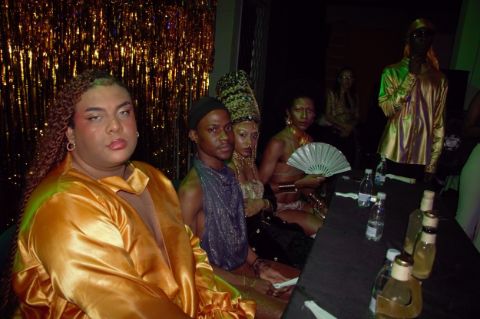Pump, Create, Elevate: Ballroom’s International Alliances
Panel Talk, Hang-Out Space
Fri., 28.11.2025
18:00–23:00
Haunani-Kay Trask Hall
In English
Free entry
Presentations and discussions take place from 18:30–22:00
Videos in English, Spanish, with English subtitles

Judges at ‘Kiki Ball Negro Marica Afrofuturista’ (2025), Cali, Colombia. Photo: courtesy of Inexorable Films
The last session of the series Pump, Create, Elevate: Ballroom’s International Alliances invites and fosters a mutual space for exchange and knowledge sharing beyond the European context of Ballroom. Within the format of a multimedia performance lecture, practitioners from Tunisia, Mexico, and Colombia share their local experiences through video contributions created for this particular occasion, including interviews and archival footage from each community. This is followed by a panel talk among members from the three different contexts, who are joined online by contributors responding from their respective locations. The session as a whole focuses on place-specific needs, historical and current particularities, and cultural and creative frames of reference, while also addressing current challenges communities face and the dreams they hope to achieve.
Co-conceived by HKW and House of St. Laurent, the Pump, Create, Elevate series aims to centre the global majority within Ballroom’s international community, and raise awareness about lived realities beyond the so-called Global North. The Ballroom’s International Alliances event constitutes a point of departure for these ambitions, and welcomes ideas and input on how international exchange and community support can grow and expand in the future.
Before and after the evening’s presentations and discussions, a hang-out space is offered for relaxation, exchanging, movement, and to gain nourishment from the various Ballroom-related audiovisual, sonic, and printed materials on hand.
The series Pump, Create, Elevate returns in 2025 with a second round of public events for and by Ballroom’s extended family. Under the continued programme Politics of Rhythm, through which HKW stimulates practices that embody dance and music to further develop and maintain communitarian knowledge, the series is hosted in collaboration with and by House of St. Laurent. With dedicated moments providing space for gathering outside of the dynamics of the ball and training, it welcomes others interested in expanding their knowledge, skills, or network. As Ballroom culture originated from trans women of African, Central and South American, and Caribbean heritage, and continues to centre racialized and sexo-diverse (or queer) people’s lives and resilience, their participation is especially invited.
With guests facilitating the programme, each session focuses on a different facet, offering a frame to look into aspects of the culture, such as expanding on and preparing for different categories, the basics and practice of categories that centre sensuality, and exchanges on the worldwide network of Ballroom and the particularities of how it takes place across different latitudes.
Additionally, there is a library available in the space featuring publications that delve deeper into ballroom culture, and its history and knowledge. In conjunction with the programme House of Houses, HKW also offers continued internal rooms for rehearsal for members of the International Resilient House of Makaveli, and for local practitioners of New Way, assembled by Litchi Saint Laurent.
With self-determination at its core, mastering the art of presentation has been a catalyst for self-empowerment inside the practice of Ballroom culture. Using fashion as a vessel of self-expression and affirmation, in line with a long history of excelling in terms of creativity, style, and precision, the Ballroom community’s art reclaims space, demands acknowledgment, and puts forth a commitment to beauty and agency.
From its early stages in Harlem’s drag balls of the 1920s to the consolidation of Vogue as an expressive movement practice, Ballroom culture has shaken the naturalization of sexuality and gender binary performativities, as well as exposed the intersecting racial and economic glass ceilings often at work. Playfully examining, deconstructing, and turning performativities into tools for anyone troubled by cis-heteronormativity and aiming to fool/surpass its segregative impact, such practices have continuously evolved beyond the framing of passing. This has included, for example, the assertion of gender non-binarism and consolidation of embodied vocabularies and language that describe less regimented and more plural ways of being. In today’s socio-cultural climate, in which far-right and fascist politicians are harshly limiting and trying to erase the existence of sexo-diverse people, safe spaces, solidarity, and support are crucial to continue building a plurality of non-patriarchal, gender-euphoric, equal futures.
In, around, and associated with HKW there is no space for, nor tolerance towards, hate speech or hate actions of any kind.
Co-production, co-curation: Georgina Philp and Litchi Ly Friedrich